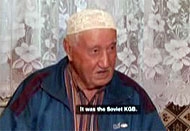In February, 3, 2009, Satellite Qatar TV-channel Al-Jazira in the program "People and Authority" presented the report on a topic "Expelled" - expelled Crimean Tatars, having described a difficult situation developed at the present on the peninsula.
Last year's war between Russia and Georgia for South Ossetia once again riveted general attention on the Black Sea Coast - the region, where it is felt the increase of international tension. The center of this region - Crimea, nowadays belongs to Ukraine, and in the past belonged to the Soviet Union.
More than 60 years ago, in the end of the Second World War, a considerable part of the Crimean Tatars - the oldest population of the Crimea - was violently deportated by the Soviet dictator Joseph Stalin to the Central Asia. Only a few went through this mass deportation and could come back home. And now decaying contradictions concerning whose land is this, can spring into conflict.
The Crimeaan Tatars feel themselves surrounded by foes more and more strongly, and they have reasons for that. All their modern history is connected with regular murders, tortures and deportations.
According to the order of Joseph Stalin who suspected them in cooperation with German aggressors during the Second World War, they were subjected to mass deportation.
"We were interrogated: who is the father, who is the mother? Where we lived under Germans? Where we worked? It was a Soviet KGB. We answered to all questions, everything as it must be, and then they came in one day and took all Tatars".

"The war started approximately in 1941. The father was taken away and sent to the army. They took all who could fight, and sent them to the front, too. And here we stayed at four - me and my three brothers. In the house stayed just us, our mother, our grandfather and grandmother. During the war we worked in the field. And when the war finished, we were all deported to Uzbekistan. They came suddenly, without warning, all boarded trucks and were carried to the station. And than all were pushed into wagons and took to Uzbekistan. In Uzbekistan my mother died, and all my brothers died too".
* * *
Nowadays, Crimea is an autonomous republic in the structure of Ukraine. It has its own constitution, which must comply with Ukrainian law. And, although the Ukrainian politics after the "Orange Revolution" of 2004 is directed towards the West, in the Crimea still dominate pro-Russian moods and their media does not recognize the indigenous Tatar culture. After the war in South Ossetia, autonomous Crimean parliament urged Ukraine to recognize the independence of Georgian separatist regions of South Ossetia and Abkhazia, allied Russia. However, many Crimean Tatars were against it.

Mustafa Kirimoglu, MP of the Crimean Tatars, stated, "According to surveys, about 70 percent of Russians and assimilated Ukrainians see their future together with Russia. And, in fact, this is quite natural, since 90 per cent of local Russians are the descendants of those brought to Crimea in 1944, after the deportation of the Crimean Tatars. But for us to recognize the independence of South Ossetia or Abkhazia is be to set an example for Russia. In this case Ukraine certainly would not agree and this would lead to the annexation of the Crimea by Russia - as it was in Abkhazia".
The movement of seizing the land faced resistance, but they are not frightened...
* * *

Daniyal Akhmetov, the leader of the Tatar people's movement, states, "It was announced that the land is sold. But we thought that if it is sold and privatized, it will be even more difficult to return it. When we understood this, we decided to take this land. We were obstructed, the police arrived, but when they began to frighten us, we blocked the road. We started protests in the streets. They attempt to hinder our campaigns. They have court decisions for that. But who can stop the people, who have a power for this? You know, when the people will have no land and housing, then we will have no choice - we will fight".
Related links:
The Conflict of Simferopol Authorities and Crimean Muftiyat Lasts



